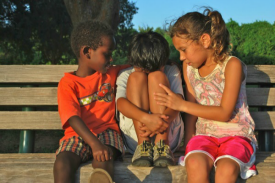I recently read an article on empathy from the New York Times, Sunday review, titled, Empathy is Actually a Choice, written by: Daryl Cameron, Michael Inzlicht AND William A. Cunningham. The article talks about empathy, and if it is possible for us to increase the current level of empathy we have.
What is Empathy – What makes us express (or not express) it?
Empathy can be simply defined as the ability to understand, share and relate to the feelings of another. The article first talks about the strange trend between the number of people in a situation who need empathy versus the amount of empathy we feel:
ONE death is a tragedy. One million is a statistic.
You’ve probably heard this saying before. It is thought to capture an unfortunate truth about empathy: While a single crying child or injured puppy tugs at our heartstrings, large numbers of suffering people, as in epidemics, earthquakes and genocides, do not inspire a comparable reaction.
Studies have repeatedly confirmed this.
I don’t know about you, but I have had this phenomenon play it in my own life. While I may express outrage about a larger issue, or might be motivated to offer a slacktivist quote or comment on social media, the bigger issues do not really elicit a deep, emotional response from me. That is a little disturbing – not only to me – but to many scientists who have done the research on this kind of thing.
Worse News About Expressing Empathy
What is even more disturbing is the following direct quote from the article:
Not only does empathy seem to fail when it is needed most, but it also appears to play favorites. Recent studies have shown that our empathy is dampened or constrained when it comes to people of different races, nationalities or creeds.
Yikes. Since I am a somewhat privileged white, middle-aged male, that puts me at the greatest risk of not being able to generate empathy for the people groups who are probably in the most need locally and globally. That’s makes a difficult problem even more difficult.
Can we improve? – Yes!
There is good news. This article expresses that we all possess the innate ability to grow and expand our empathy – if we exert the proper effort. The article doesn’t really suggest good, practical ways to develop and grow our empathy – at least not in my opinion.
I have personally experienced substantial development of empathy in myself, and seen it substantially grown in others, through the vehicle of mission trips.
Mission Trips
For the sake of this discussion, let’s define a mission trip as:
Intentional interaction with a people group that is different than you in one more more significant ways, for the primary purpose of getting to know individuals in that peeple group better.
You could be going to visit an oppressed people group in a developing country on the other side of the globe, or across the street to an elderly couple, or across town to people of a different nationality, race, socioeconomic status or creed. If it’s intentional, if they are different than you, and your primary purpose is to get to know them better, that is how I would define a mission trip.
My Mission Trip Experience
When I first had an opportunity to visit Frontline Missions in the Philippines to work with street children for a couple weeks, I had no idea what to expect. My wife Vicky and I had always supported a child through a mission outreach program. We ended up catching an infomercial about poor kids early on in our marriage, and we felt compelled to sponsor a child. We loved getting pictures, little notes, etc. We would pray for her, think about her when we saw the picture hanging on the fridge; but, we really didn’t have empathy for her – pity maybe – but not empathy.
When I spent several hours over several days with Frontline in the Philippines, sitting down with and talking to kids who actually do live on the street, who have actually suffered abuses of all kinds, who go hungry sometimes for days, who have been forced into prostitution; when I actually got to know someone who has experienced that, it completely changed me. Not only did I feel a great sense of empathy for these kids, but spending time with them also developed in me a deep compassion for them..
The simplest definition of compassion is:
To suffer with
I knew these kids by name. I knew who their brothers and sisters were. I knew the stories that led to each one of them living on the streets. I knew some of the stories of the things that would happen to them on the street. I knew some of their hopes and dreams. Getting to know them allowed me to suffer with them, to understand how they feel.
This experience completely changed the equation for me. I moved from pity to empathy and compassion. This had the effect of increasing the amount of time I thought about these kids and the amount of effort and creativity I put into helping them address the issues that were important to them. My experience created a long-term, personal relationship with the kids and the Frontline organization that has lasted for 9+ years – over 16 trips with friends and family – creating opportunity for developing empathy, compassion and action in others – starting a missional business out there, and other kinds of involvement.
VALUE of Mission Trips
The value of mission trips done relationally is so much greater than the cost of a plane ticket and on-the-ground expenses. It develops a significant amount of empathy and compassion – which in turn, completely changes us from the inside-out, and can change the world.
Of course, Frontline has to work hard, be creative and take risks to create experiences that are intentional – with the primary purpose of getting to know the people involved in the outreach: from those reaching out to those being served. That is not easy to do. Many mission organizations settle for lesser mission trip experiences.
The value to cost ratio is even higher when you are going across town, or across the street. The time, money and risk investment is much smaller, but the return can be just as good – if not better. Not everyone will be able to make it across the globe 16 times in 9 years – and start a business in a developing country – but we can walk across the street 16 times in 9 years, and go across town at least that many times.
Mission Trips in Town
My wife and I have been mentoring under-resourced kids in a local elementary school for some five or six years now. Getting to know these kids for weeks, sometimes years, has been a huge blessing for us. We have developed empathy and compassion for the issues people who are different than us are experiencing every day, right in our own backyard. Our empathy has driven further investment, advocacy and other activities that have mutual benefit for us and the new groups of people we know.
I have even benefited greatly by taking the time to get to know people whose political, religious, ideological and social view are much different than mine. I now have empathy and respect for people who hold different views than me. I see the human side – the emotional side and the cognitive side – of the different issues that people struggle with like immigration, gender, orientation, and others.
Daily Mission Trips
Going to work or school can be an every day mission trip for you if you are intentional about getting to know people. So can going to a movie, the grocery store – even going to church. How many of us attend churches that attract people who are from from God – every week – who have no relational connection yet at the church? If I am not intentionally meeting new people at church, I don’t believe that I can really be on mission.
So, no matter what the cost, so long as you can afford it, I believe mission trips are worth it every time. The more the merrier!






